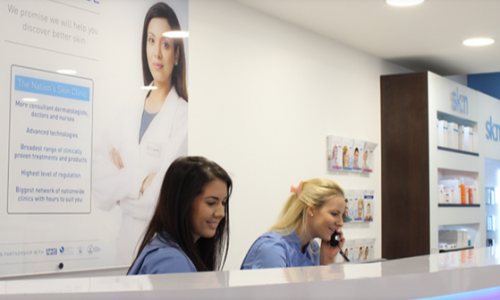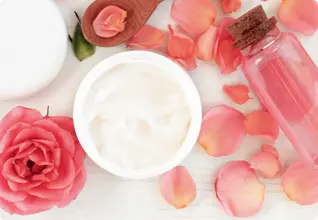Acne & Rosacea – What’s The Link?

Rosacea is a chronic, long-term skin condition that usually causes redness on the face, focusing on the cheeks, nose, chin, and forehead areas, though it can also cause acne spots, pustules and papules on the skin.
This condition is common, usually affecting women, but symptoms may be worse on men and those with lighter skin. There is no cure for rosacea, but treatment can help to control and reduce the symptoms.
Read on to discover more about acne & rosacea, how they are linked, and whether you may be experiencing papulopustular rosacea.
What Is Papulopustular Rosacea
Acne rosacea, also known as papulopustular rosacea, is the second subtype of rosacea and the second most common rosacea; it is associated with spots and breakouts. These spots sometimes contain pus, and your skin may feel hot or tender.
Those with papulopustular rosacea may also experience extremely dry skin, becoming thick and scaly, turning into rough patches called plaques.
What Is Acne And Acne Rosacea?
Acne is a common skin condition caused by comedones (blackheads and whiteheads) and pus-filled spots (pustules). Acne occurs when pores (hair follicles) become clogged with dead skin cells, debris and sebum, causing spots.
This skin condition usually arrives at puberty and can vary in severity, such as a few spots on the face, back, and chest, which most adolescents will experience, to more severe cystic acne, that causes scarring impacts self-confidence. Acne can be caused by various factors, including genetics, bacterial growth, hormonal fluctuations, and more.
Acne rosacea (Papulopustular rosacea), on the other hand, is part of the common skin disease usually characterised by flushing of the skin, alongside spots, pustules, and papules. It is commonly mistaken for acne, especially in the early stages; and although they have similar symptoms, they are essentially two different conditions.
Papulopustular Rosacea
How To Tell The Difference Between Acne VS Rosacea
Though acne and papulopustular rosacea have very similar symptoms, there are a few key differences that will help you set them apart in order to seek the appropriate treatment.
One of the main distinguishing features would be comedones; these are a small flesh-coloured papule that is usually recognised as blackheads or whiteheads, these are specific for acne. An open comedone is a blackhead, and a closed comedone is a whitehead; if you have a mix of these across your face, you’re most likely to be dealing with acne.
On the other hand, If you have more inflamed bumps such as papules and pustules, it may be trickier to figure out which condition you’re dealing with because these are a symptom of both acne and papulopustular rosacea.
Inflammatory acne can cause your comedones to swell and turn into a red, pus-filled cyst, and acne rosacea leads to swollen, red bumps. Both of these are pretty similar.
If you’re still unsure about your bumps, identifying your triggers and looking for patterns in your breakouts will help you figure out what condition you have.
Get To Know Your Acne Rosacea Triggers
Certain activities, foods, temperatures, or emotions will cause rosacea to flare up; these are your rosacea triggers. They vary by individual, but they often include factors such as weather, temperature, certain foods and drinks, and beauty or skincare products.
Understanding these triggers will ensure you discover if you have acne rosacea and allow you to deal with the symptoms better. Knowing what triggers your rosacea outbreaks can help you to reduce rosacea flare-ups and irritations, prevent your rosacea from worsening further, and get better results from treatments.
Acne is more commonly triggered by hormonal changes, which is why your acne may become more severe during puberty, menstruation, pregnancy, and menopause. However, it can also be caused by certain medication and medical treatments.
As a general guideline, acne rosacea (papulopustular rosacea) is triggered externally, and acne (acne vulgaris) is triggered internally. If your spots flare up around your period or a medication change, then you probably suffer from acne, but if it happens after you eat certain foods, then you’re most likely dealing with a form of rosacea.
Another factor to consider is your age; rosacea is more likely to be diagnosed after 30, whereas acne usually first occurs in puberty or early adulthood.
Here are some of the most common triggers for rosacea, so you know what to watch out for.
- Alcohol
- Caffeine
- Hot drinks
- Dairy products
- Spicy foods
- Aerobic exercises
- Hot baths or saunas
- Hot or cold weather
- Humidity
- Strong winds
- Stress or anxiety
- Exposure to sunlight
- Skincare or make-up products
- Some medicines
Read our blog dedicated to understanding rosacea triggers and how you can find out yours.
How To Treat Rosacea
If you’re wondering how to get rid of rosacea, then our professional rosacea treatments can help persistent redness and unwelcome spots, working to visibly reduce the signs of these conditions. The best rosacea treatment will depend on your variations of symptoms.
- Laser treatment
Broken blood vessels are often the cause of the redness; our facial thread vein treatment reduces the appearance of enlarged, damaged, or visible blood vessels. This treatment helps to restore your natural complexion through an intense pulsed light from a handheld laser device. This targets and dissolves any prominent facial blood vessels.
- Chemical peels
Skin peels work to reduce inflammation and redness visibly; they are suitable for sensitive skin and will leave your skin visibly brighter, all whilst encouraging a stronger skin barrier. In addition, chemical peels are a non-invasive treatment both for acne rosacea and uneven pigmentation.
Other treatments for rosacea include oral antibiotics. However, it is best to avoid over-the-counter medications and creams, as scented, oil-based and alcohol-based products can often worsen the condition. You should always see a dermatologist before using any products or remedies – they can provide tailored recommendations and create a bespoke treatment plan that suits your skin.
How To Treat Acne
If you suffer from acne or breakouts regularly, visiting a skin specialist to discover what acne treatment is available for you can make a big difference. They can help you by prescribing tablets, or medical-grade creams if you’re dealing with moderate acne, or chemical peels or laser treatment if the acne is more severe.
If you’d prefer a product-based treatment, a glycolic or salicylic acid cleanser can help to keep your pores open and break down any oil to avoid them from becoming blocked.
Hyaluronic acid can also help ensure that your skin is adequately hydrated, and a topical nicotinamide cream (also called niacinamide) can help keep acne at bay.
Key Takeaways
- Though acne and rosacea can have very similar symptoms, they are different conditions and may need to be treated differently.
- Understanding your triggers will help you discover if you have acne rosacea and allow you to deal with the symptoms better.
- The right treatment or skincare regime can help you confidently manage rosacea and acne.
At sk:n, our dermatologists recommend at least a course of acne treatment or rosacea treatment alongside skincare products to get the best results for your skin. Find your nearest clinic and book an appointment today!
Related Articles

08
Apr 2024

08
Apr 2024
Request a callback
One of our friendly sk:n advisors will call you to book your consultation.
- More than 450 consultants, doctors, nurses and medical practitioners
- Regulated by the Care Quality Commission, Health Inspectorate Wales and Health Improvement Scotland
- Partner of the NHS
- Rated excellent by our clients on Trustpilot
- Strict safety and care protocols





